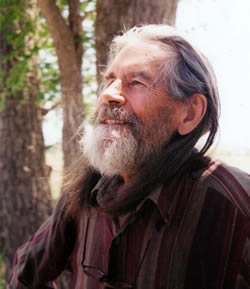 |
||||||
|
|
"Who are the extremists? Our rulers, that's who. Why is that? They have the power, that's why." The letter goes on to list some of the rulers' war crimes and domestic law-breaking and then asserts that the "fringe" people, with all their faults, are much closer to the truth about the way the world works than fanatics in high places. I suppose that by now we all know this, but the point I was trying to get to is this: why keep on the agony of choosing a president from one of the two major parties, the Donkeys or the Elephants. There are always fringe candidates. For instance, one might write in Jim Stiles, editor of this journal. Read his platform in this issue. Makes sense, doesn't it ? Or Ralph Nader or Cynthia McKinney, a black woman who is the presidential candidate of the Green Party. Now don't give me that old split-the-vote argument. Whoever becomes president, a Donkey or an Elephant, will keep the war going, will refuse to go up against insurance corporations to fight for government as the single payer, and on down the line of favoring the haves. And I've heard this other old piece of propaganda since I was a little kid with big ears in Jackson Hole: Government is bad; Big Government is worse. Well, we ought to know by now that private businesses benefit greatly from government subsidies. We are going through one of those struggles right now, the lavish government-funded tax breaks et cetera for Wind Power Turbine corporate hawkers who descended on this low-wind area (because it is poverty-stricken?) offering hand-outs in exchange for land set-asides for industrial wind turbines. Likewise, in the west the Bureau of Land Management and Forest Service rent public lands at much lower than market prices for sheep and cattle grazing and throw in range improvement services as well, all federally financed. But these subsidies are mere peanuts when we look at the huge conglomerates like banks, oil and methane drillers, private contractors in Iraq--Soldiers of Fortune totally out of control by military or U. S. civilian officialdom--huge agri-corporations and chemical firms and on down the roster of massive conglomerates who now have world-wide power thanks to meddling in internal affairs of "lesser Nations" by World Bank and International Monetary Fund. The United States, by the way, owns 51 percent of the assets of the World Bank. When we then throw in the money spent on war, we begin to see that our empire is stark naked and hated around the world. We are living now in the high altitudes or dark underworlds, so ably described by Ned Mudd,. It's hard to breathe up there or down there. Have you noticed ? The August/September Zephyr has some remarkable pieces. The Point Blank essay by Harvey Leake notes that "it is our addiction to artificiality resulting from our addiction to the feeling that we have escaped from nature." He refers to a Navajo herdsman, from a book of family reminiscences, Wolfkiller: Wisdom from a nineteenth Navaho shepherd. Gibbs Smith Publishers, 2007. "Wolfkiller, received his first lesson in the wisdom of nature in the 1860s when he was about six years old. His grandfather heard him complaining about the icy wind and gently explained that it was something to be thankful for. 'All things are beautiful and full of interest if you observe them closely and study them.' "After considering this advice for a few days Wolfkiller came to see that the wind is good. 'We had come to think that the wind is just a useless thing to cause us unhappiness, but now we saw that it had many purposes . . . ' "When winter came again Wolfkiller's mother asked him to go outside and roll in the snow. 'The snow will be with us for several moons now. and if you roll in it and treat it as a friend it will not seem as cold to you.'" Leake's article ends with this admonition: "The ills of the environment will never be cured by those who are themselves dedicated to the pursuit of artificiality and lack the wisdom to see the dichotomy between that goal and their wishes for the health of the earth." Does this have anything to do with the voting in November? Yes.. In "The Mob Rules.Suggestions for the Honest Environmentalist," Doug Meyer refers to the great moral shift from the 1970s to now, a passage of only 38 tumultuous years: Richard Nixon's State of the Union speech in 1970. "The great question of the 70s is, shall we surrender to our surroundings, or shall we make peace with nature and begin to make reparations for the damage we have done to our air, land and to our water." That same devious president was also the man who signed the Endangered Species Act. Meyer's comment on Nixon's speech, "That's right, a Republican president said that then, but this year's political phenom, Barack Obama . . . wouldn't touch that sentence with a ten-foot pole. Listen carefully to what both McCain and Obama say this fall: the real benefit to taking action will be to create jobs. Saving the environment? What's that? What has happened to us? Meyer offers no quick solutions. Near the end he says that ". . . we who believe criticism to be the more honest approach should be prepared for a difficult time ahead." He refers to Martin Luther King's thoughts about reality in our country. "We should remember that King's withering social commentary caused even those who supported him to eventually call him 'radical' and 'out of touch.' " We protesters can only say "Amen" to that; knowing full well how so many of our fellow citizens cast scorn on our 'Out Of Touch' status, as well as the contempt thrown at us by the rulers. We hold on, partly because the cliff edge is so close, but also to uphold in a dark world of disenchantment the people's flag of all colors, all races, all nations. We are the loyalists, sticking to the hidden history of our nation. Rulers do their best to build fences around us and push us off into far corners where nobody will believe we exist., but though the road will be rough, we will prevail. Why? Because there is no alternative. The destruction of the Earth, a direct result of the combined forces of our rulers' extremism, puts us on the list of endangered species. I've said this before, but don't mind repeating it. All of the above crimes--yes, crimes against people, against flora and fauna, soils, waters and atmospheres--have consequences. An aside: Nixon wasn't a very sophisticated ecologist; failed to include flora and fauna in his Report to the Nation. Wrenching decisions wait for us in November. Are we so afraid of McCain that we feel we have to vote for cheerleader Obama ? We can't close our eyes to the fascist danger of McCain. What to do ? Let's not be totally dumb. If we happen to live in a state where a few votes might make a difference, then choose Obama. But, meanwhile, there's a movement to build. We can work for fringe candidates. After all, none of them hope to win; the fire in the belly that motivates them is to build a powerful public power. People Power changed things in the late nineteenth century--Populist Movements--and in the twentieth century (100 years of war) Great Depression, union organizing, anti-war-in-Vietnam movement and Black Power, Civil Rights and Feminist struggles. Our job is to reach back, grab those momentums and put them into the current struggle against war and war's murder of innocents. Are we whiners? Of course, how else can we get the word out? But we are much more than that. We have the power to reverse disaster. By that I mean a 180 turn-around. And that's where writings like Leake's and Meyer's are vital; each in his own way is a defenders of nature, the earth and its creatures, our home. Artificiality can't go on forever and neither can endless economic growth. We know that. Our rulers don't, or if they do they are putting on a grand show of "Who, me worry?" My letter to the Telegram ends with a quote by Eugene Debs who ran for president from behind bars, received a substantial vote. He said, "I'm not going to lead you into the promised land because someone else will come along and lead you out." What was he talking about? Our relentless search for leaders to take the burden off our shoulders, beginning with the idolization of George Washington. He was, by all accounts, a pretty decent guy even though very wealthy, but back then his leadership was backed by a substantial majority of citizens who took pride in the new beginnings: no kings and the Bill of Rights. During Washington's reign two rebellions broke out, one by farmers in Massachusetts, Shay's Rebellion, and another in Pennsylvania, dubbed the Whiskey Rebellion. Both were about taxes that had to be paid in hard, scarce cash. We can rebel too, not with smooth bore muskets, but by street actions. Yes, join the protests, and don't settle for being herded into out-of-sight cages. All sorts of actions are waiting for us: parades and other kinds of highly visible gatherings; support of unions; visits to ruling offices and plazas; barging in where we are not welcome. And, above all, creation of mini-democracies inside our own movements. Let diversity reign! Letters to newspapers too, but why stop there? Our last protest in the county seat of Franklin county brought choruses of honks from trucks and cars; waves and thumbs up and V-signs. One day we got a brief honk from a cop car. Very different reactions compared with '03. There are always a few counter signals too, always will be. We are Patriots. We show the flag. We believe in our country. It's different from other nations, just as other nations are different from ours. We carry on the grand tradition of citizenship, of guilt at the terrible crimes our nation has committed, and still commits, and determination to do something about it. We also look back into our history, the great precedents laid down by the Abolitionists and the Women who struggled hard for their rights to full and complete citizenship, and the courageous acts in Jim Crow south for human dignity, human rights. We do hold those rights to be self evident. That's where we stand, knowing that there are always people's movements, always have been. Look back into what we have done, the bad and the good, then look forward. Each day counts. Let's build the movements. After the elections, let's keep on building. Whoever is president has to know we're not going to take it much longer. Oh, yes, it isn't all tea and cookies. There will be set-backs. A person gets used to those; it's part of the action. Next time you hear from this old Losing Solitude site that I value beyond measure, we will be in Ohio, trying to decide how the wind is blowing there. |
|||||







 On July 23 the Malone Telegram (Franklin county, New York state) published a letter of mine that began:
On July 23 the Malone Telegram (Franklin county, New York state) published a letter of mine that began: